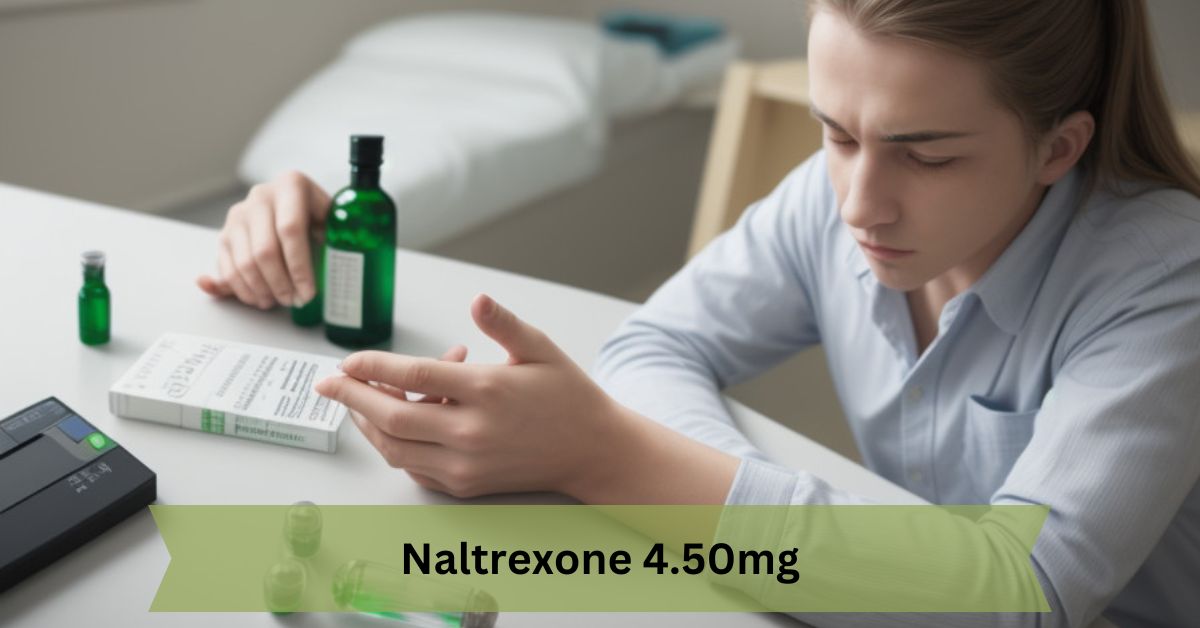Understanding Naltrexone 4.50mg: Managing Fatigue and More
Naltrexone 4.50mg is a medication often prescribed to help people with alcohol dependence and opioid addiction. It works by blocking the effects of opioids in the brain, which helps reduce cravings and withdrawal symptoms.
However, some people report feeling extremely tired after taking naltrexone 4.50mg. This article explores why this might happen, what you can do about it, and other important information about the medication.
What is Naltrexone 4.50mg?
Overview
Naltrexone 4.50mg is a lower dose of the medication typically used to help manage addiction. At this dosage, it’s sometimes referred to as Low Dose Naltrexone (LDN). This medication can help people stop drinking alcohol or using opioids by reducing the pleasurable effects of these substances.
History of Naltrexone
Naltrexone was first approved by the FDA in 1984 for the treatment of opioid addiction. In 1994, it received approval for the treatment of alcohol dependence. The use of low-dose naltrexone (LDN) has gained popularity more recently, with some evidence suggesting benefits for various conditions beyond addiction.
How It Works
Naltrexone works by blocking opioid receptors in the brain. When these receptors are blocked, the effects of opioids are diminished. For alcohol dependence, it helps reduce the urge to drink by affecting the brain’s reward system.
Mechanism of Action
Naltrexone binds to the opioid receptors in the brain, preventing other substances from activating these receptors. This blockade reduces the rewarding effects of alcohol and opioids, thereby decreasing the desire to consume these substances.
Uses of Naltrexone 4.50mg
- Alcohol Dependence: Helps reduce cravings and the urge to drink. Studies have shown that naltrexone can significantly decrease the number of heavy drinking days.
- Opioid Addiction: Blocks the effects of opioids to aid in recovery. It is often part of a comprehensive treatment plan that includes counseling and support groups.
- Off-Label Uses: Some doctors prescribe it for conditions like chronic pain, autoimmune diseases, and mental health issues. Research is ongoing into the effectiveness of LDN for these conditions.
Off-Label Uses in Detail
- Chronic Pain: LDN may help reduce pain by modulating the body’s pain pathways.
- Autoimmune Diseases: Conditions like multiple sclerosis and Crohn’s disease may benefit from the immune-modulating effects of LDN.
- Mental Health: Some studies suggest LDN can help with depression and anxiety, possibly by reducing inflammation in the brain.
Why Do People Feel Extremely Tired on Naltrexone 4.50mg?
Common Side Effects
Feeling extremely tired is one of the common side effects reported by people taking naltrexone 4.50mg. Other side effects may include nausea, headache, dizziness, and sleep disturbances.
List of Common Side Effects
- Nausea: Some people may experience stomach upset.
- Headache: A common side effect that can range from mild to severe.
- Dizziness: Can occur, especially when standing up quickly.
- Sleep Disturbances: Including insomnia or feeling sleepy during the day.
How Naltrexone Affects Your Body
Naltrexone affects your central nervous system, which can lead to feelings of fatigue. It may also interfere with your sleep patterns, making you feel more tired during the day.
Detailed Explanation
Naltrexone’s blockade of opioid receptors can disrupt the natural balance of neurotransmitters in the brain, leading to changes in mood, energy levels, and sleep. This disruption can cause some people to feel unusually tired.
Individual Differences
Everyone’s body reacts differently to medications. Some people might feel very tired on naltrexone 4.50mg, while others might not experience this side effect at all.
Factors Influencing Individual Reactions
- Genetics: Genetic differences can affect how your body metabolizes naltrexone.
- Other Medications: Interactions with other drugs can influence side effects.
- Overall Health: Your general health and other medical conditions can play a role.
Managing Fatigue on Naltrexone 4.50mg
Tips to Reduce Fatigue
- Stay Hydrated: Drink plenty of water to keep your body hydrated. Dehydration can worsen fatigue.
- Eat Well: A balanced diet can help maintain your energy levels. Include plenty of fruits, vegetables, and whole grains.
- Exercise Regularly: Physical activity can boost your energy and improve your mood. Even a short walk can make a difference.
- Get Enough Sleep: Aim for 7-9 hours of sleep per night to feel rested. Establish a regular sleep routine.
- Take Breaks: Short breaks during the day can help manage fatigue. Try stretching or deep breathing exercises.
Additional Tips
- Limit Caffeine: Too much caffeine can interfere with sleep and cause energy crashes.
- Mindfulness and Relaxation: Techniques like meditation and yoga can help manage stress and improve sleep quality.
- Consult a Dietitian: Consulting a dietitian can help you create a meal plan that supports your energy levels and overall health.
Talking to Your Doctor
If you’re experiencing extreme tiredness, it’s important to talk to your doctor. They may adjust your dosage or suggest other strategies to help manage this side effect.
What to Discuss with Your Doctor
- Symptom Details: Be specific about your fatigue symptoms (when they occur, how severe they are, etc.).
- Medication Review: Discuss all medications and supplements you are taking to check for potential interactions.
- Health Check: Ensure there are no other underlying health conditions contributing to your fatigue.
Other Important Information About Naltrexone 4.50mg
Potential Benefits
- Reduced Cravings: Helps reduce the urge to use alcohol or opioids, supporting recovery efforts.
- Improved Recovery: Can support long-term recovery by reducing relapse rates.
- Off-Label Uses: Some people find relief from other conditions, like chronic pain or autoimmune diseases, though these uses should be closely monitored by a healthcare provider.
In-Depth Look at Benefits
- Enhanced Quality of Life: By reducing cravings and relapse, naltrexone can significantly improve the quality of life for individuals struggling with addiction.
- Support for Co-Occurring Disorders: For those with co-occurring mental health issues, naltrexone may provide additional benefits, although more research is needed.
Potential Risks
- Side Effects: Includes tiredness, nausea, headache, and dizziness. It’s important to monitor these and report any severe or persistent symptoms to your doctor.
- Interactions: Can interact with other medications, so it’s important to tell your doctor about all the medicines you’re taking. This includes over-the-counter drugs and supplements.
- Not for Everyone: Not suitable for people with certain medical conditions or who are currently using opioids. Individuals with liver disease, for instance, need to be particularly cautious.
Detailed Risks
- Liver Toxicity: Naltrexone can cause liver damage, especially at higher doses. Regular liver function tests are recommended.
- Withdrawal Symptoms: If you are currently dependent on opioids, taking naltrexone can precipitate withdrawal symptoms. It is crucial to be opioid-free for at least 7-10 days before starting naltrexone.
Monitoring and Follow-Up
Regular follow-up appointments with your healthcare provider are essential to monitor the effects of naltrexone and make any necessary adjustments.
Regular Check-Ups
- Liver Function Tests: Regular blood tests to monitor liver health.
- Mental Health Assessments: Evaluations to ensure that naltrexone is not negatively impacting your mental well-being.
- Physical Health Monitoring: Routine checks to monitor overall health and address any side effects promptly.
FAQs About Naltrexone 4.50mg
1. What should I do if I feel extremely tired on naltrexone 4.50mg?
It’s best to talk to your doctor if you’re experiencing extreme fatigue. They can provide guidance and may adjust your dosage or suggest other ways to manage this side effect. Sometimes, adjusting the timing of your dose can help mitigate tiredness.
2. Can I drink alcohol while taking naltrexone 4.50mg?
You should avoid drinking alcohol while taking naltrexone, as it can interfere with the effectiveness of the medication and increase the risk of side effects. Naltrexone is designed to reduce the pleasurable effects of alcohol, which can help in reducing consumption.
3. How long does it take for naltrexone 4.50mg to start working?
Naltrexone can start working within a few hours of taking it, but it may take several weeks to see the full effects, especially for reducing cravings. Consistency in taking the medication as prescribed is crucial for achieving the best results.
4. Is naltrexone 4.50mg addictive?
No, naltrexone is not addictive and does not produce a high or euphoria. It works by blocking the effects of opioids and alcohol, making them less enjoyable, which helps in reducing dependency.
5. Can naltrexone 4.50mg help with weight loss?
Some people have reported weight loss while taking naltrexone, but it is not specifically approved for this purpose. Any weight loss effects should be discussed with your doctor. The impact on weight can vary based on individual metabolic responses and lifestyle changes.
6. What are the long-term effects of taking naltrexone 4.50mg?
Long-term use of naltrexone is generally considered safe for many people, but it requires regular monitoring by a healthcare provider. Potential long-term effects can include liver health concerns, so regular liver function tests are important.
7. Can I stop taking naltrexone 4.50mg abruptly?
It’s not recommended to stop taking naltrexone abruptly without consulting your doctor. Your doctor may provide a tapering schedule to minimize any potential withdrawal effects or a return of cravings.
8. How should naltrexone 4.50mg be stored?
Store naltrexone at room temperature, away from moisture and heat. Keep it in its original container, and ensure that it is out of reach of children and pets.
9. Are there any dietary restrictions while taking naltrexone 4.50mg?
There are no specific dietary restrictions associated with naltrexone. However, maintaining a healthy diet can help manage side effects like fatigue and support overall well-being.
10. What should I do if I miss a dose of naltrexone 4.50mg?
If you miss a dose of naltrexone, take it as soon as you remember. If it’s almost time for your next dose, skip the missed dose and resume your regular schedule. Do not double the dose to catch up.
Conclusion
Naltrexone 4.50mg can be an effective medication for managing alcohol dependence and opioid addiction, but it’s important to be aware of potential side effects like extreme tiredness. By understanding how naltrexone works and how to manage its side effects, you can better navigate your treatment and recovery journey. Always consult with your doctor for personalized advice and treatment plans.






